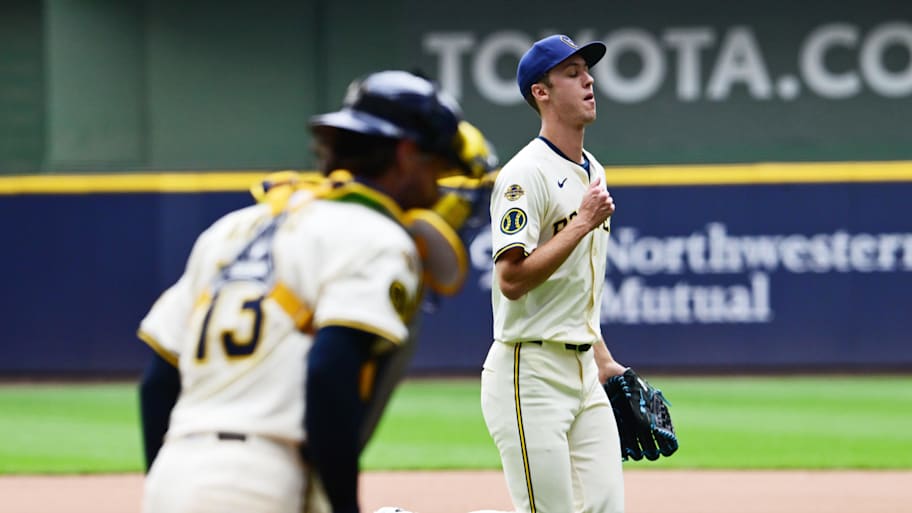Milwaukee Brewers rookie pitcher Jacob Misiorowski made his highly anticipated Major League debut on June 12, throwing five hitless innings against the St. Louis Cardinals. Eight days later he carried a perfect game into the seventh against the Minnesota Twins. It is one of the most impressive opening acts any pitcher has ever put together. And through five starts the righthander has been excellent, posting a 4–1 record with a 2.81 ERA, inflated by a sole misfire against the New York Mets.
So, with 25 innings pitched to his name, he is an All-Star. He'll soon be rubbing shoulders with future Hall of Famers with sparest résumé to share in the game's history. This is a surprising development and there are no shortage of fans and players who downright hate it. Trea Turner and Nick Castellanos made pointed comments about the decision, which left their deserving Phillies teammates Ranger Suarez and Cristopher Sanchez to watch from home. Turner called it a joke and terrible. Castellanos wondered whether MLB is turning into the Savannah Bananas. Columnists everywhere are having a field day ripping the perceived publicity stunt and pleading for a return to meritocracy.
Yet one must ask themselves honestly whether that ever existed. The All-Star Game voting process, which allows fans to select starters, is a popularity contest. Sure, in an ideal world the most deserving are rewarded on reasonable sample size. In practice, that doesn't happen. Fans happen. As someone who loves the Detroit Tigers, it's awesome that Javy Baez is starting in Tuesday night's game. As someone with a sense of fairness, something feels askew.
Life is absolutely too short to worry about All-Star game snubs. Baseball enters this week with the best exhibition in all of sports and will leave with that status. People aren't necessarily wrong to cry foul over this and for their sake one hopes they're too busy doing that to realize Misiorowksi is actually in Atlanta because of his first 11 innings.
At some point perhaps they can take a deep breath and realize that Paul Skenes had thrown 66 1/3 innings before starting for the National League last season, which he'll do again on Tuesday. Skenes was more hyped and clearly dominant and no one's ever going to wonder why he was tasked with being the fifth rookie to ever get the ball first in an ASG. His 11 first-half starts tied the previous record for fewest starts by an All-Star Game starter, set by rookie Mark Fidrych in 1976. Hideo Nomo had been on the mound 13 previous times in 1995. Fernando Valenzuela made 14 starts in his stunning 1981 first half. The Washington Senators' Dave Stenhouse made 15 in 1962.
These All-Star Games turned out to be the apex of Fidrych's and Stenhouse's careers. Valenzuela and Nomo had long and productive careers. It's not super premature to start planning a weekend in Cooperstown around Skenes and pray for no injuries. Point is, with these pitching comets, it's a speculative market. Prior performance does not ensure future results. So how crazy is it that Misiorowski is being given extra credit for barely a tease? Maybe not as wild as one may think when you make a more accurate comparison. Yet that presents what makes the decision strange.
Fidrych talked to the ball and took pictures with Big Bird. Valenzuela owned Los Angeles at 19. Nomo was a great unknown and a peak at a new international market. Dontrelle Willis was appointment television during his rookie year of 2003. Carlos Perez delighted with his intensity and antics for the Montreal Expos in 1995. Those latter two would find themselves in All-Star Game relief duty.
The difference with Misiorowksi, in addition to the service time, is that there hasn't been the same organic buzz or phenomenon growing. Perhaps it's correct to say there hasn't been enough time. All the previous versions of this type of pitcher has spawned a reaction whereas in this case it feels like baseball is doing something proactive.
Like the Mean Girls with "fetch," it's not unfair to say baseball is trying to make Misiorowski happen. That is not the worst thing in the world. They want to spark intrigue among viewers and consumers. He's being treated no differently than a stock that's shown impressive early returns. The great part here is that the stakes are remarkably low. If he looks hittable in the second half, no one will care because it'll be on to the next great injustice. And plenty of other one-time All-Stars have faded out of the public eye as quickly as they came.
Or this could be the greatest thing to ever happen to him. A fun story about clean slates and wide-open futures. Something to care about and someone to root for or against based on perception. Imagine two months ago being told that you would have a strong Jacob Misiorowski opinion. Imagine being confident you have the correct one now, with almost nothing to go on.
More MLB on Sports Illustrated
This article was originally published on www.si.com as Jacob Misiorowski Is Not Like the Others.
